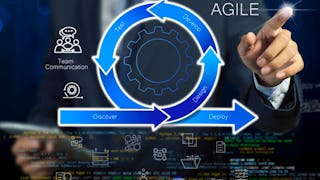This course gives you an expansive overview of Agile project management. By the end, you’ll know Agile’s history, how it works, and how it's different from other approaches to project management. You’ll also learn the Agile Manifesto, including its 4 values and 12 principles. And you’ll even understand how to adopt and apply Agile in a VUCA environment.

Enjoy unlimited growth with a year of Coursera Plus for $199 (regularly $399). Save now.

Foundations of Agile Project Management
This course is part of Google Agile Essentials Specialization

Instructor: Google Career Certificates
2,151 already enrolled
Included with
(22 reviews)
Recommended experience
What you'll learn
Confidently guide your team or organization through a shift to Agile
Explain the Agile project management approach and philosophy, including values and principles
Describe the history and motivation behind the emergence of Agile
Differentiate Agile frameworks and explain when and why to blend approaches
Skills you'll gain
Details to know

Add to your LinkedIn profile
September 2025
See how employees at top companies are mastering in-demand skills

Build your subject-matter expertise
- Learn new concepts from industry experts
- Gain a foundational understanding of a subject or tool
- Develop job-relevant skills with hands-on projects
- Earn a shareable career certificate

There are 3 modules in this course
You will explore how the Agile project management approach works and discuss the main difference between Agile and Waterfall. You will then get a brief history of how Agile came about and get to know the four values and twelve principles of the Agile Manifesto.
What's included
4 videos1 reading
You will learn more about adopting an Agile mindset and why teams benefit from an Agile approach. Finally, you will understand how to adopt and apply Agile in a VUCA environment.
What's included
2 videos1 reading2 assignments
You will explore the origins of the word "Scrum", how the term relates to rugby, and why the Scrum framework is so popular. By the end of this module you will understand concepts related to Scrum, Kanban, XP, and Lean.
What's included
2 videos1 assignment
Earn a career certificate
Add this credential to your LinkedIn profile, resume, or CV. Share it on social media and in your performance review.
Instructor

Offered by
Explore more from Leadership and Management
 Status: Free Trial
Status: Free TrialPolitecnico di Milano
 Status: Free Trial
Status: Free Trial
Why people choose Coursera for their career




Frequently asked questions
Agile is an approach to project management that breaks down a large project into smaller, manageable time frames, called sprints. Teams can work on multiple parts of a project concurrently, which can make Agile more effective than traditional project management because resources can be used simultaneously and feedback is gathered and incorporated more frequently. In addition, Agile teams stay organized and efficient because they spend less time creating documentation or waiting for something to be completed.
If you're already in a project management role, you may be familiar with a more traditional management approach called Waterfall. Waterfall project management uses a linear process: Each phase of the project flows into the next one, like a waterfall. With this approach, one task is finished before another one is started. Agile project management is different because it is iterative, meaning the team is working on different parts of the project at the same time and project processes can be repeated many times throughout the project, incorporating feedback at every stage. Agile can be more effective than traditional project management because resources are used simultaneously in smaller time frames, called sprints. This iterative model means customer and stakeholder feedback is gathered more frequently and less time is spent creating documentation or waiting for something to be completed.
Agile project management is a sought-after skill across industries. In Google Agile Essentials, you’ll earn a certificate to showcase your skill set to your network and employers. Whether you’re a current or aspiring project manager, you’ll get the skills necessary to propel projects to new heights. In under 10 hours, you’ll get hands-on experience using agile methodologies and building Scrum artifacts. Through videos, readings and resources, you’ll learn how to create a powerhouse Agile team, unleash efficiency with organization, and apply in-demand project management practices.
This self-paced course is accessible to everyone and is designed to fit into busy schedules. You don’t need any technical experience to begin, and the skills you’ll learn can be applied to a variety of roles across industries. After completing the course, you can add your credential to your resume to display expertise to current and future employers.
More questions
Financial aid available,
¹ Some assignments in this course are AI-graded. For these assignments, your data will be used in accordance with Coursera's Privacy Notice.







